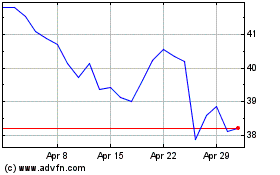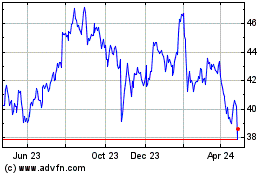Here's Are the Real Reasons Comcast Customers Won't Get to Watch Nets, Yankees Games
November 25 2015 - 4:52PM
Dow Jones News
By Joe Flint And Shalini Ramachandran
The business of TV is going through so much change that even
live sports--the golden goose of the industry--are no longer
immune.
Once upon a time, a cable provider dropping the network that
airs the New York Yankees for subscribers in the northeast would
have been almost unthinkable. But that's exactly what happened last
week. The dispute between Comcast Corp. and YES Network showcases
the rising tensions between TV distributors and programmers as both
try to adapt to the realities of online viewing, cord-cutting and
the power of data.
Last week, Comcast stopped carrying YES Network, a regional
sports channel that is home to the New York Yankees and Brooklyn
Nets and majority owned by 21st Century Fox. Comcast had been
distributing the channel to roughly 900,000 homes in New Jersey,
Connecticut and Pennsylvania.
Pay-TV providers have been willing to pay more to carry YES
Network than any other regional sports network in the
country--almost $5 a month per subscriber, according to SNL Kagan.
So what changed? That depends on who you ask.
Comcast cited new insights into its set-top-box viewing data as
a key factor in its decision to stop carrying YES, noting that the
channel cost too much relative to its low viewership. The data
showed that more than 90% of Comcast customers who receive YES
didn't watch the equivalent of even one-quarter of the Yankees' 130
baseball games this past season. (It is worth noting that the
channel wasn't dropped until the baseball off-season.)
Fox said it's yet to see Comcast's data and claims the dispute
is really over Comcast wanting to maintain a contractual clause
that could have hampered Fox's ability to strike deals with
emerging digital TV distributors. (21st Century Fox was until
mid-2013 part of the same company as Wall Street Journal-owner News
Corp.)
While carriage fee disputes have been going on for years, the
fights have gotten more frequent as distributors seek to push back
on rising programming costs, and as TV channels seek to stake out
their flexibility in the streaming landscape.
"The precedents that are made here will ripple through the
industry," said Ed Desser, president of consulting firm Desser
Sports Media.
At issue from Fox's perspective is contractual language known as
a "most-favored nation" clause, which essentially helps a
distributor ensure that a channel won't strike a better deal with a
rival, according to people close to Fox. Comcast was asking for
"special treatment that tilts the playing field in their favor,"
YES Network Chief Executive Tracy Dolgin said in an interview.
Under its old contract, which was struck before Fox took a
controlling interest in the channel, YES Network was bound by a
most-favored nation clause to offer Comcast any better terms that
it might offer a rival distributor, like a cheaper rate or
streaming rights. Comcast wanted to maintain that clause in the new
contract, a person close to Comcast said.
But Fox wanted the clause to apply to its channels as a group to
ensure that Comcast doesn't get to "cherry-pick" favorable terms
from a creative deal it might strike with a new entrant, the people
close to Fox said. For instance, if it granted Apple the right to
carry YES at a cheaper rate but won wider distribution of other Fox
channels like Fox Sports 1, it would want Comcast to also abide by
the terms. That means Comcast would have to agree to the wider
distribution of those other channels to secure the cheaper rate for
YES. Under the previous clause, Comcast would only have had to
abide by terms that apply to YES.
Comcast viewed Fox's demand as an attempt to use the Yankees to
leverage greater distribution of Fox's other channels, a person
close to Comcast said.
Comcast's carriage deal with YES expired Jan. 31. During
contract extensions, Comcast had agreed to pay a higher rate, which
Fox executives point to as a sign that the dispute wasn't over
price. But Comcast agreed to the higher rate while it was in the
process of buying Time Warner Cable, the person close to Comcast
said. After the merger fell apart, the price no longer made sense,
the person said.
Subscribe to WSJ: http://online.wsj.com?mod=djnwires
(END) Dow Jones Newswires
November 25, 2015 16:37 ET (21:37 GMT)
Copyright (c) 2015 Dow Jones & Company, Inc.
Comcast (NASDAQ:CMCSA)
Historical Stock Chart
From Mar 2024 to Apr 2024

Comcast (NASDAQ:CMCSA)
Historical Stock Chart
From Apr 2023 to Apr 2024
